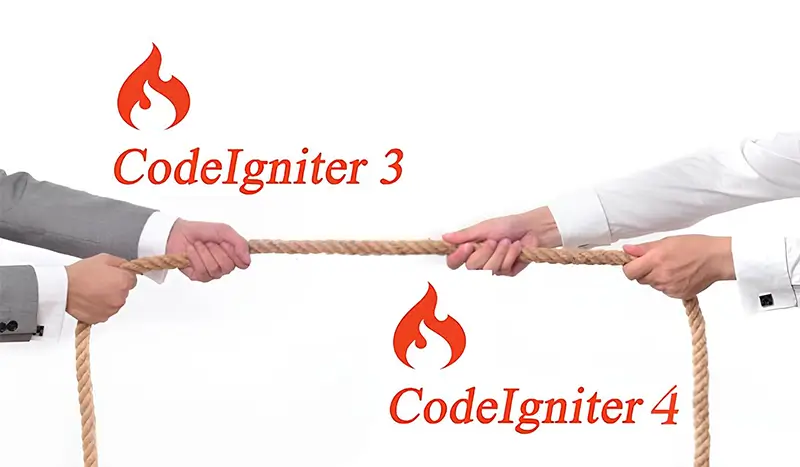CodeIgniter is truly bliss for developers as it provides the simplest way to develop dynamic websites in PHP. It has several built-in functions that make it easy for the users of CodeIgniter to resolve any kind of problems if arises. But do you know what is CodeIgniter Framework? What is the latest version of CodeIgniter available, and how is it different from its previous ones?
CodeIgniter is an open-source framework that works with MVC (Model-View-Controller) model which makes it easier for developers to optimize time while developing completely functioning websites and applications on PHP. CodeIgniter is the fastest among all available PHP platforms. There are separate versions of CodeIgniter which are utilized by its users. Out of all other versions, CodeIgniter 3 and CodeIgniter 4 are the stable ones. CodeIgniter framework allows you with out of the box libraries for the database as well as for performing basic operations like sending emails, file uploading, session management, etc.
CodeIgniter 3
CodeIgniter 3 is the current version of this framework that is licensed under the MIT License. It was released on 19th Sept. 2019. There are several modifications available with this current version. The CI_Log is to incorporate PHP_EOL rather than\n at the end of messages. Several database related bugs are fixed too.
Server requirements:
To operate the CodeIgniter 3 framework, PHP version 5.6, or above is required. It may also work on 5.3.7 also but the old versions might not be secured and also the performance will not be up to the mark there. Whereas in 5.6 the steadiness, as well as the performance is sort of good. Certain databases are required for CodeIgniter 3 such as-
1. MySQL (5.1+) via the mysql (deprecated), mysqli and, pdo drivers
2. CUBRID via the cubrid and pdo drivers
3. Oracle via the oci8 and pdo drivers
4. PostgreSQL via the postgre and pdo drivers
5. MS SQL via the mssql, sqlsrv (version 2005 and above only)
6. SQLite via the sqlite (version 2), sqlite3 (version 3) and pdo drivers (Interbase/Firebird via the ibase and pdo drivers)
7. ODBC via the odbc and pdo drivers (you should know that ODBC is an abstraction layer)
CodeIgniter 4
CodeIgniter 4 is the upcoming version of this framework which is supported by MIT License. It will be published soon. CodeIgniter 4 has been kept quite flexible to provide you a smooth experience. The main goal of CodeIgniter4 is to enable you to develop your projects much faster. It will help you creatively focus on your project by diminishing the amount of code needed earlier for that particular task.
Server Requirements:
For CodeIgniter 4 PHP version 7.2 or newer is required along with additional *intl*extension and *mbstring* extension. PHP extensions such as php-json, php-xml, and php-mysqlnd must be enabled on your server. For using CURL Request, libcurl is required to be installed.
The currently supported databases are-
1. MySQL (5.1+) via the MySQLi driver
2. PostgreSQL via the Postgre driver
3. SQLite3 via the SQLite3 driver
There are some more outstanding databases available which are yet to be included in CodeIgniter4 such as-
1. MySQL (5.1+) via the pdo driver
2. Oracle via the oci8 and pdo drivers
3. PostgreSQL via the pdo driver
4. MS SQL via the mssql, sqlsrv (version 2005 and above only) and pdo drivers
5. SQLite via the sqlite (version 2) and pdo drivers
6. CUBRID via the cubrid and pdo drivers
7. Interbase/Firebird via the ibase and pdo drivers
8. ODBC via the odbc and pdo drivers (you should know that ODBC is an abstraction layer)
CodeIgniter 3 vs CodeIgniter4
There are certain noticeable differences in between CodeIgniter 3 and CodeIgniter 4 such as-
1. Support for PHP versions: As we have got discussed earlier the PHP version required for CodeIgniter 3 is 5.6 whereas, for CodeIgniter 4, it is 7.2 or newer.
2. Use of namespaces: CodeIgniter 3 doesn’t use namespace whereas CodeIgniter 4 uses namespace as it is entirely written in PHP7
3. Directory Organization: The file structure is CodeIgniter 4( i.e. /app,/system,/public,/writable,/tests ) is completely different from that of CodeIgniter 3 that is managed in two directories only (i.e./application,/system)
4. Migration between versions: In between the migration from version 2 to 3, version 3 was overwriting the files in system directory as well as updating the names of certain files. When version3 is changed to 4 then a new structure is adopted to solve the issue. Apart from this CodeIgniter 4 is not compatible with the backward transfer of data; hence the process of developing versions 3 to 4 may require little more effort.
5. Settings: In CodeIgniter 3 the necessity was to perform a good number of configurations. But with CodeIgniter 4 the initial setting is negligible for the application to run.
6. Native Support for .env files: There is an additional feature in CodeIgniter 4 that it provides native support for .env files along with an optimization of the settings with different environments where it may run. Whereas such features are not there in CodeIgniter 3.
7. Use of Entities: in the case of CodeIgniter 3 there is no native support for entities that will help to build the database as a part of an application, so if any person wants to use it have to take the help of the third-party libraries and can make required adjustments. Whereas in CodeIgniter4 this feature is supported.
8. Performance: Since CodeIgniter 4 uses PHP 7 in writing along with a minimum configuration on the server has a better performance than that of CodeIgniter 3 which uses PHP 5.
9. Autoloading: Compared to CodeIgniter 3, CodeIgniter 4 has a more effective autoload process since appropriate namespaces are used there but in the case of CodeIgniter 3 the configuration has to be done manually so the autoload process is very slow here.
CONCLUSION
CodeIgniter 4 has already gained lots of positive impressions before its official launch because of its amazing features. Since this version requires PHP 7 as minimum configuration, so, it’s already there on the cutting edge of technology. However, the framework is still in the development phase, so it can’t be used directly for commercial purposes.
Oditek Solutions is expertise with CodeIgniter developers to help you meet your business challenges. We provide a team of developers as well as a technical support team to help you resolve all your queries related to CodeIgniter Framework.







